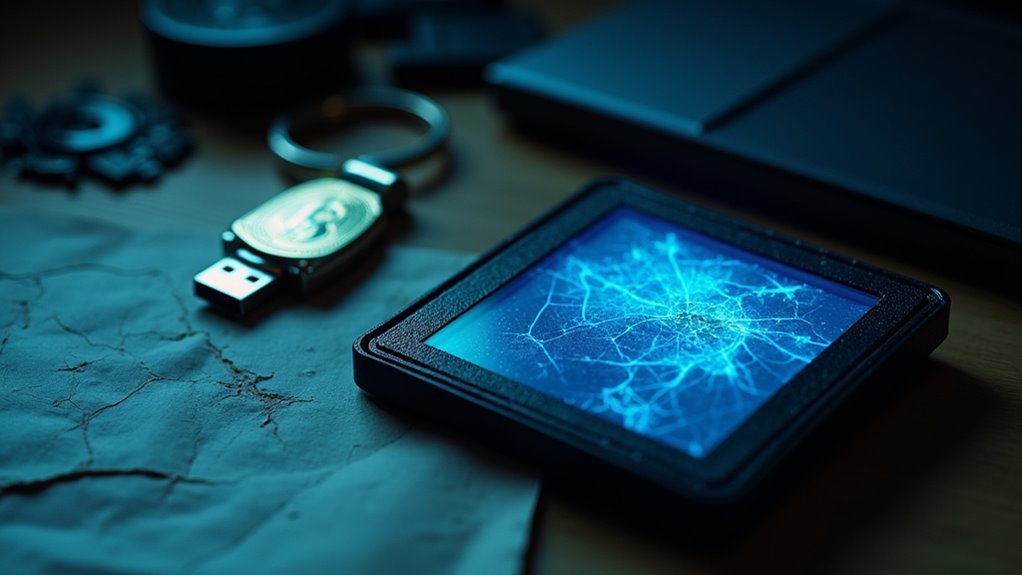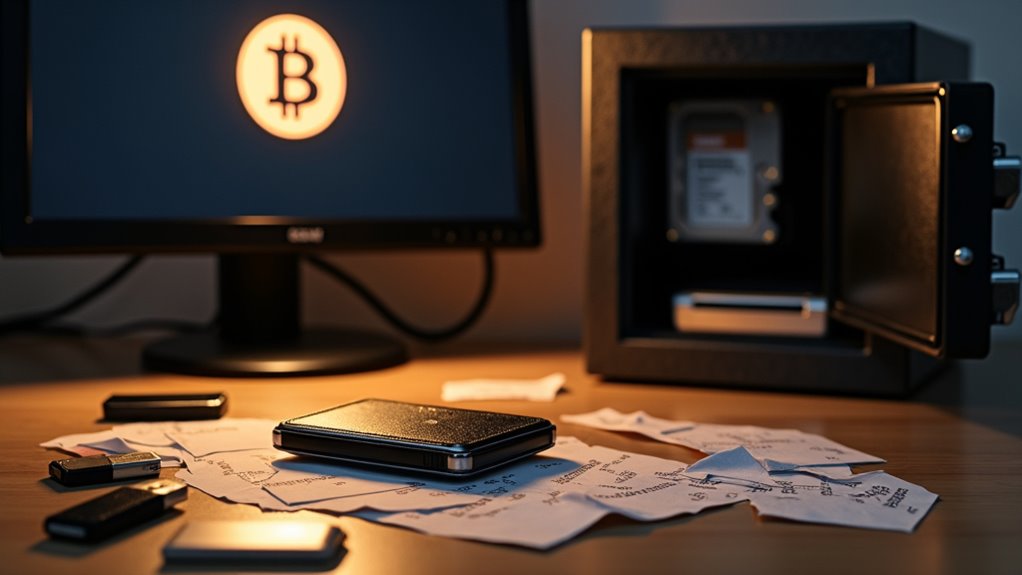Lost Bitcoins are brutal – up to 3.7 million BTC gone forever, worth about $100 billion. Professional recovery services claim they can help, but success rates are a measly 2.5%. Most losses come from forgotten keys, damaged hardware, or misplaced seed phrases. Some poor souls have their fortunes trapped behind digital walls they’ll never breach. Prevention through proper storage and backups is imperative, though telling crypto holders to back up their wallets is like lecturing teenagers about cleaning their rooms. The full story gets worse.

While losing your car keys is frustrating, losing access to millions in Bitcoin is downright devastating. Just ask the countless crypto enthusiasts who’ve lost their digital fortunes – we’re talking about a mind-boggling $100 billion worth of Bitcoin that’s seemingly vanished into the digital void. Between 2.3 and 3.7 million Bitcoins are estimated to be lost forever, representing up to 18% of the total supply. Gone. Poof. Thanks, cryptography.
The harsh reality is that most lost Bitcoins are about as recoverable as your high school dignity. The same security features that make Bitcoin nearly impossible to hack also make it nearly impossible to recover when things go wrong. People lose access in predictably human ways: forgotten private keys, damaged hardware wallets, and misplaced seed phrases. It’s like losing the combination to an unbreakable safe – except this safe potentially contains millions of dollars. Each Bitcoin lost is worth approximately $61,000 per coin. The largest single loss comes from Satoshi Nakamoto’s coins, with approximately 1 million BTC permanently dormant.
Some recovery methods do exist, though success rates hover around a depressing 2.5%. Professional recovery services use specialized software to help users who remember partial information about their wallets. High-tech firms claim they can recover some lost coins, but their success rates are about as reliable as a chocolate teapot. Sometimes, people get lucky and find old backups or seed phrases tucked away in forgotten places. Unlike traditional wallets that store physical currency, Bitcoin wallets only store the keys needed to access your cryptocurrency on the blockchain.
Prevention is where the real story lies. Hardware wallets have become the gold standard for securing large sums of cryptocurrency. Regular backups of seed phrases and private keys are key – though telling someone to back up their wallet is like telling teenagers to clean their room. Professional storage services offer additional protection, but they’re not foolproof either.
The psychological impact of losing access to Bitcoin can be severe. Early adopters who lost access to thousands of coins now worth millions aren’t just dealing with financial loss – they’re living with the knowledge that their fortune is literally trapped in digital limbo. It’s a special kind of torture that only the crypto realm could create.
Frequently Asked Questions
Can a Bitcoin Recovery Service Steal My Recovered Coins?
Fraudulent recovery services can indeed steal recovered bitcoins. Users should only work with legitimate services that charge after successful recovery and never share private keys or pay upfront fees to prevent theft.
How Much Do Professional Bitcoin Recovery Services Typically Charge?
Professional Bitcoin recovery services typically charge between 10-30% from recovered funds. Fees vary based on wallet size, with larger recoveries receiving lower rates. Most services operate on success-based payment models.
Are There Any Tax Implications When Recovering Lost Bitcoin?
Recovered Bitcoin must be reported as taxable income in the year received, especially if a tax deduction was previously claimed for the loss. This applies whether the recovery is partial or complete.
Can Hardware Wallet Manufacturers Help Recover Lost Bitcoin Passwords?
Hardware wallet manufacturers typically cannot help recover lost Bitcoin passwords. Due to their security-focused design, they do not store passwords or recovery information. Users must maintain their own seed phrases and passwords independently.
What Happens to Lost Bitcoins That Are Never Recovered?
Lost bitcoins remain permanently inaccessible in the blockchain, effectively reducing the total circulating supply. These unrecoverable coins become dormant, contributing to Bitcoin’s scarcity and potentially influencing its overall market value.









